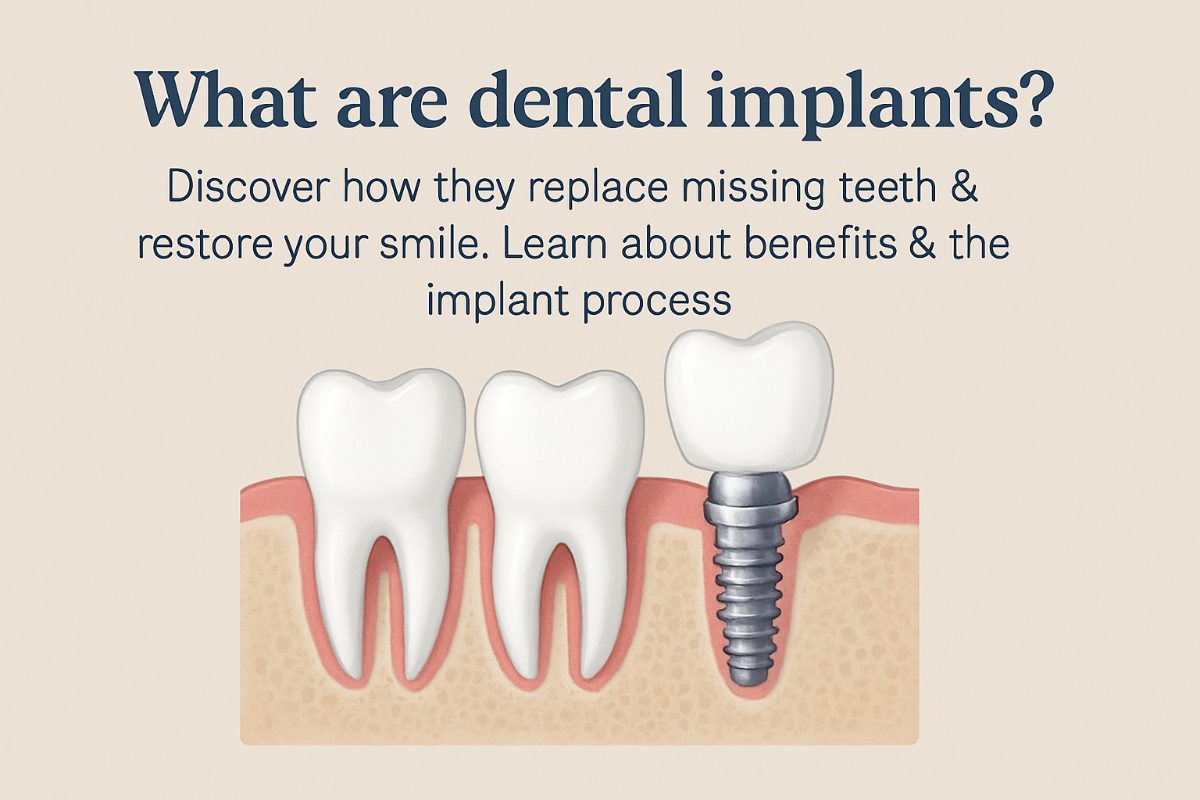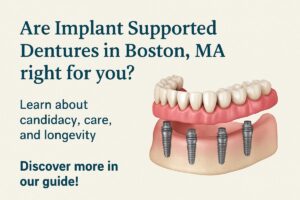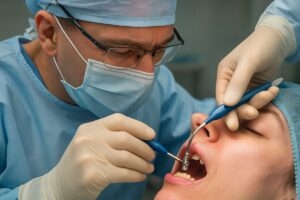What are dental implants? Dental implants are artificial tooth roots placed in the jaw to hold replacement teeth. This guide explains how implants work, who they help, the process, risks, costs, and how to pick the right provider.
What Are Dental Implants? Components and basic function
A dental implant is a small post—usually titanium—that replaces a tooth root. An implant works with two main parts: the abutment, which connects the post to the visible tooth, and the crown, which looks and functions like a natural tooth. Together these parts restore chewing, speech, and the appearance of a real tooth.
Because implants fuse to the jawbone (osseointegration), they act like natural roots. That support helps preserve bone, prevents neighboring teeth from shifting, and lets you bite and chew with confidence.
Common implant types
- Single-tooth implant: Replaces one missing tooth with one implant and one crown.
- Implant-supported bridge: Uses two or more implants to hold a bridge that replaces several teeth.
- Full-arch solutions (All-on-4 style): Uses four or more implants to support a full upper or lower denture for people missing most or all teeth.
Who is a good candidate for dental implants?
Good candidates generally have healthy gums, adequate jawbone, and no untreated oral infections. They should be committed to good oral hygiene and regular dental care. Most adults can be evaluated for implants, but candidacy depends on overall and oral health.
Benefits of implants
- Long-term durability and stability compared with removable dentures.
- Preserve jawbone and facial structure by replacing tooth roots.
- Restore chewing ability and improve speech and confidence.
Risks and possible complications
Complications can include infection, failure of the implant to integrate, nerve or sinus issues, and the need for additional procedures like bone grafts. Risk increases with smoking, uncontrolled diabetes, poor oral hygiene, or unmanaged gum disease. Your dental team will assess these risks and recommend ways to reduce them.
The typical implant process and timeline
The implant journey varies by case but follows common steps:
- Consultation and imaging: Exam, X-rays, and often a CBCT scan to plan placement precisely.
- Tooth extraction (if needed): Remove damaged teeth before placing implants, sometimes in the same visit.
- Implant placement: The surgeon places the implant post into the jawbone.
- Healing and osseointegration: Bone grows around the implant—this can take 3–6 months.
- Abutment and crown placement: After integration, the abutment and final crown (or bridge/denture) are attached.
Factors that can lengthen the timeline
Bone grafting, sinus lifts, slow healing, smoking, and certain health conditions can add months to treatment. Your provider will explain timing during planning and offer options like same-day temporary teeth when appropriate.
Cost, care, and choosing the right provider
Costs vary by location, the number of implants, and any extra procedures. Single-tooth implants often range widely; full-arch treatments cost more. Many practices offer financing, payment plans, and can work with dental insurance for parts of treatment. Ask your provider for a clear estimate and options for spreading payments.
How to care for implants
Care for implants much like natural teeth: brush twice daily, clean between teeth with floss or interdental brushes, and see your dentist for regular cleanings and checkups. Avoid tobacco and excessive hard foods. Regular professional care helps detect early issues and keeps implants healthy for years.
Choosing a provider
Look for clinicians with specialty training and strong implant experience—prosthodontists or oral surgeons are ideal. Ask about:
- Years of implant experience and success rates.
- Use of digital tools like CBCT scans and guided surgery planning.
- The implant systems they use and any warranties or follow-up care.
Advanced technologies—such as guided surgery, high-quality implant systems, and same-day crown options—can improve accuracy and comfort. Don’t be afraid to ask for before-and-after photos and patient references.
Stuparich & Nouel Dental Associates in Boston’s South End specializes in implant and prosthetic care. Drs. Mauro Stuparich and Alexandra Nouel are prosthodontists with decades of combined experience and advanced implant training. Their team uses technologies like CBCT imaging, guided surgery planning, and same-day CEREC restorations to plan and deliver predictable results. Schedule a consultation to learn how dental implants could restore your smile and function.




